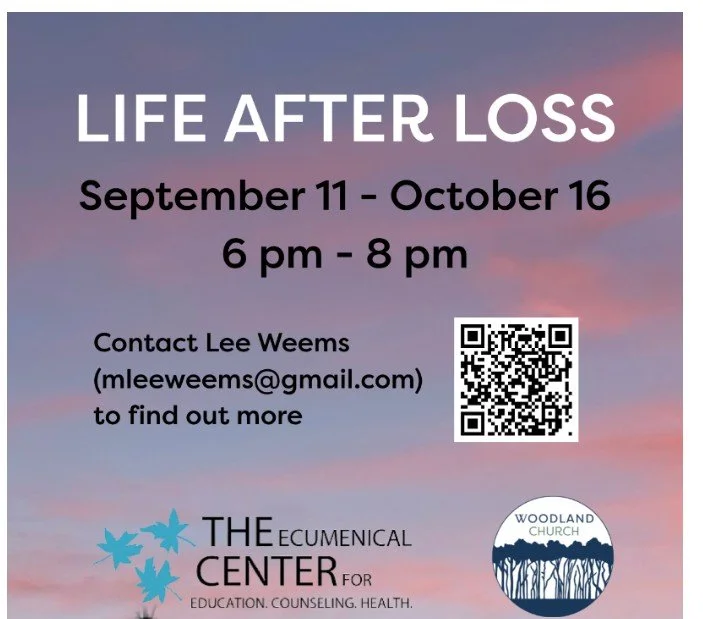Grief Ministry
Grief is the price one pays for loving and being loved. The Grief Ministry offers support to members of Woodland and our community.
We have a six-week Life After Loss support group each fall in September and October. The group meets from 6:30 p.m. to 8 p.m. and is led by trained grief facilitators in coordination with the Ecumenical Center.
Throughout the year, the atrium has a pamphlet rack with free brochures on various issues of grief.
On All Saints Sunday in the fall, we recognize Woodland members who have died in the previous months.
Woodland offers a Service of Hope and Healing on a Wednesday evening during the Lenten season.
Volunteers from Woodland are available to visit with individuals or families going through a grief crisis.
We also refer to community resources that provide support in preparing for the death process.
Contact Lee Weems for questions
or more information.
RESOURCES
NOK Box - Next of Kin Box
Don’t leave a scavenger hunt for your next of kin
https://www.thenokbox.com/
LOLA - Loss of Life Advocates
A network of trusted professionals assisting
you before, during, and after a life crisis or loss
https://www.lossoflifeadvocates.com/
Life after Loss at Woodland
A six-week class held each year in the fall,
facilitated by Lee Weems
From the Four “Tasks” of Mourning
J. William Worden, PhD, a well-known grief therapist, strongly believes a person must mourn the death of someone who has been significant in his or her life. From interviews with and counseling bereaved persons, Dr. Worden developed his Four Tasks of Mourning. If mourning is not complete, growth and development cannot take place and could cause lifetime complications. The following (“grief work”) takes effort on your part in order to complete them. The tasks do not necessarily happen in this exact order. You might go back between two or three of them while completing your grief work.
-
PAIN
To accept the reality of the loss
Even when a death is expected, there is still a feeling that it didn’t happen.
Recognize that the person is dead and will not return.
In order to accept that the death has occurred, you must accept that on both an intellectual and emotional level.
Traditional rituals, such as a funeral, help you accept the death as real.
SUGGESTED BOOKS
-
STRUGGLE
To work through the pain of grief
The intensity of the pain and the way it is felt is different for everyone.
It is impossible to not experience some amount of pain when someone very close to you dies.
Friends and family are often uncomfortable with your pain and try to interrupt this task by making you feel as if you are feeling sorry for yourself.
People often try to deny this task by denying the pain through the use of alcohol, drugs or food, idealizing the dead, avoiding the reminders of the dead, traveling constantly, as well as other ways.
No matter how successful a person is in avoiding the pain now, it will eventually come back later as possibly some form of depression or as complicated grief in response to another loss.
The person not only has to experience the grief from the new loss but now also the complex grief from the past loss.
-
HOPE
To adjust to an environment in which the deceased is missing
Adjusting to the new environment is dependent upon what the relationship was with the deceased and what roles the deceased played in the relationship.
Around the third month after the death, the roles the deceased played become more obvious.
Grief work now focuses on coming to terms with living alone, raising children alone, facing an empty house, managing home maintenance and finances, and caring completely for oneself.
It is important not to regress to the point of thinking that you are helpless, inadequate, incapable, childlike, or personally bankrupt.
It takes time and patience to figure out how to fulfill the deceased’s rules.
It is important to try to make sense out of the loss and to try to regain some sense of control over your life.
-
LIFE
To redirect the emotional energy that grief requires and reinvest it in other relationships
In this task, you finally find the ability to emotionally reinvest in someone or something else.
You do not forget the deceased or the memories you have shared, but are able to find enjoyment in life again.
In this task it is not to “give up (your) relationship with the deceased, but to find an appropriate place for the dead in (your) emotional life – a place that will enable (you) to go on living effectively in the world.”
“The fourth task is hindered by holding on to the past attachment rather than going on and forming new one. Some people find loss as painful that they make a pact with themselves never to love again” (Worden, I.W., 1991, p17)
The deceased are never forgotten or replaced but remain a part of you.
You are not the same person you were, and you never will be.
With time and grieving, the pain will lessen and you will redefine yourself.


